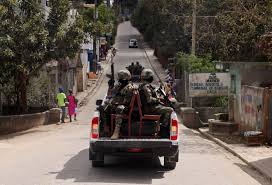
Kenya has raised concerns over the quality of logistical support provided by the United States to its police contingent deployed in Haiti.
More than a year after Kenya sent its police forces to join the Multiple Support Mission in Haiti (MSS), established in October 2023 to curb gang violence, questions are emerging about the effectiveness of the support received.
The mission aims to restore order in Port-au-Prince, where rival gangs continue to engage in violent clashes.
While acknowledging Washington’s overall commitment, President William Ruto highlighted shortcomings in the American contribution during his address to the United Nations General Assembly in New York on Monday.
“I want to commend the United States for the logistics and vehicles provided, but unfortunately, most of the vehicles were second-hand and therefore broke down several times,” Ruto said.
The Kenyan leader warned that these breakdowns exposed officers to extreme danger while patrolling high-risk areas. Since February 2025, three Kenyan police officers have been killed in ambushes in neighborhoods dominated by gangs opposed to authority.
“Our personnel were put in great danger when they broke down in very dangerous places. But at least they responded. We did not receive any useful support from the other contingent, however,” he added.
The challenges extend beyond vehicle quality. The mission is operating with fewer officers than initially planned: 991 personnel are deployed, significantly below the target of 2,500. The majority are Kenyan, supported by smaller numbers from Guatemala (150), El Salvador (78), Jamaica (23), the Bahamas (6), and Belize (2).
In Haiti, critics have voiced concern over the mission’s safety and effectiveness. Some argue that, despite its symbolic significance as an expression of solidarity within the African diaspora, the Kenyan deployment should be reassessed to prevent further loss of life.
The situation underscores the difficulties of international peacekeeping in volatile urban environments, highlighting the need for reliable equipment, adequate staffing, and robust coordination among contributing nations.



